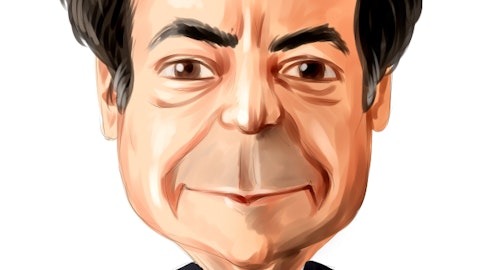There probably is no other sector that has burned hedge funds this year as bad as healthcare has. Though the decline in the sector started in the second-half of 2015 itself, it was only this year that several prominent names in the industry saw their stocks falling to record lows. However, very few hedge funds saw that coming and a lot of them bet heavily on healthcare stocks going into 2016. Taking into account the turmoil in the sector, we thought of compiling a list of stocks from the healthcare and pharmaceutical space that were popular among the over 800 hedge funds we cover at the end of last year, but have disappointed those funds this year by slumping hard. In this article, we will focus on the five healthcare stocks that topped our list.
We track prominent investors and hedge funds because our research has shown that historically their stock picks delivered superior risk-adjusted returns. This is especially true in the small-cap space. The 15 most popular small-cap stocks among a select group of investors delivered a monthly alpha of 80 basis points between 1999 and 2012 (see the details here).
#5 Vertex Pharmaceuticals Incorporated (NASDAQ:VRTX)
– Investors with Long Positions (as of December 31): 48
– Aggregate Value of Investors’ Holdings (as of December 31): $1.50 billion
Although the ownership of Vertex Pharmaceuticals Incorporated (NASDAQ:VRTX) among funds covered by us inched down by three during the fourth quarter, the aggregate value of their holdings saw an increase of 6.8% during the same period. Vertex Pharmaceuticals Incorporated (NASDAQ:VRTX)’s stock fell significantly in January tand ended the first quarter down by 36.8%. Among the funds that managed to safeguard themselves from large losses ahead of this decline was Ken Griffin‘s Citadel Investment Group, which reduced its stake in the company by 70% to 708,486 shares during the fourth quarter. Despite the poor performance of the stock this year, several analysts feel that it will rebound in the coming months because of the rising sales of the two drugs ‘Kalydeco’ and ‘Orkambi’ that the company currently has in the market and the likelihood of FDA approving two other drugs by the company, which are currently in Phase 3 development. Vertex Pharmaceuticals Incorporated reported non-GAAP quarterly profits for the first time in its last earnings release, which is another reason why most analysts have a positive outlook on the stock. On April 10, analysts at Leerink Swann reiterated their ‘Outperform’ rating on the stock.
Follow Vertex Pharmaceuticals Inc / Ma (NASDAQ:VRTX)
Follow Vertex Pharmaceuticals Inc / Ma (NASDAQ:VRTX)
Receive real-time insider trading and news alerts
#4 Endo International plc – Ordinary Shares (NASDAQ:ENDP)
– Investors with Long Positions (as of December 31): 53
– Aggregate Value of Investors’ Holdings (as of December 31): $2.84 billion
Endo International plc – Ordinary Shares (NASDAQ:ENDP) lost more than half of its market capitalization in the first three months of 2016 itself, ending the first quarter down by 54%. During the last quarter of 2015, the number of investors from our database with long positions in the stock fell by eight and the aggregate value of their holdings in it shrunk by $1.29 billion. On March 31, the U.S. Federal Trade Commission (FTC) filed a complaint in federal court against Endo International plc – Ordinary Shares (NASDAQ:ENDP), accusing its Endo Pharmaceuticals unit of using pay-for-delay deals to block the market launch of lower-cost generic versions of two drugs. The suit alleges that Endo Pharmaceuticals paid $112 million to Impax Laboratories Inc (NASDAQ:IPXL) in 2010 to delay the launch of its generic version of Opana ER until January 2013 and paid hundreds of millions of dollars to Watson Laboratories (now a part of Allergan plc Ordinary Shares (NYSE:AGN)) to delay the launch of its generic version of Lidoderm until September 2013. Analysts at Leerink Swann reiterated their ‘Outperform’ rating on Endo International’s stock on April 7 and cut their price target to $37 from $51.
Follow Endo International Plc (NASDAQ:ENDP)
Follow Endo International Plc (NASDAQ:ENDP)
Receive real-time insider trading and news alerts
#3 Express Scripts Holding Company (NASDAQ:ESRX)
– Investors with Long Positions (as of December 31): 54
– Aggregate Value of Investors’ Holdings (as of December 31): $3.58 billion
Moving on, the ownership of Express Scripts Holding Company (NASDAQ:ESRX) among investors covered by us came down by four during the fourth quarter, but the aggregate value of their holdings in it increased by $147 million during the same period. Billionaire Stephen Mandel‘s Lone Pine capital was one of the hedge funds that initiated a stake in Express Scripts Holding Company (NASDAQ:ESRX) during that period; it bought nearly 3.2 million shares of the company. Last month health insurance major Anthem Inc (NYSE:ANTM) sued the company to recover damages for pharmacy pricing that it alleged were higher than competitive benchmarks. According to Anthem Inc (NYSE:ANTM)’s lawsuit, Express Scripts Holding Company owes it $3 billion. After the news of the lawsuit emerged, Express Scripts Holding Company’s CEO stated that he has ‘no clue’ how Anthem Inc (NYSE:ANTM) reached that figure. Analysts who track Express Scripts Holding Company feel that the stock has now reached attractive levels and investors should consider buying it because of the competitive advantages the company enjoys over its peers and macroeconomic trends, which are now in its favor.
Follow Express Scripts Inc (NASDAQ:ESRX)
Follow Express Scripts Inc (NASDAQ:ESRX)
Receive real-time insider trading and news alerts
#2 McKesson Corporation (NYSE:MCK)
– Investors with Long Positions (as of December 31): 63
– Aggregate Value of Investors’ Holdings (as of December 31): $3.06 billion
Among the companies covered in this list, McKesson Corporation (NYSE:MCK)’s stock suffered the least decline during the first quarter, losing 20.17% of its value during that time. During the October-December period, the number of investors covered by us with long positions in the stock inched down by five and the aggregate value of their holdings in it fell $251 million. With ownership of over 2.76 million shares of McKesson Corporation (NYSE:MCK), Andreas Halvorsen‘s Viking Global was its largest shareholder among the funds we track at the end of 2015 . In January this year, McKesson Corporation began a strategic review and found that it needs to reduce its workforce to align its cost structure with its business needs. After reaching that conclusion, on March 17, it announced that it will be laying off 1,600 employees or nearly 4% of its U.S. workforce. For its fiscal 2016 fourth quarter analysts expect the company to report EPS of $3.00 on revenue of $46.91 billion, higher than the EPS of $2.94 on revenue of $44.93 billion it delivered in the same quarter last year.
#1 Valeant Pharmaceuticals Intl Inc (NYSE:VRX)
– Investors with Long Positions (as of December 31): 83
– Aggregate Value of Investors’ Holdings (as of December 31): $12.55 billion
Unsurprisingly, Valeant Pharmaceuticals Intl Inc (NYSE:VRX) is the top healthcare stock that has disappointed the most number of smart money investors this year. Though the ownership of the company among the funds in our database declined by five and the aggregate value of their holdings slid by over $5 billion during the fourth quarter, it was still one of the most popular stock among the funds we track. Billionaire Bill Ackman‘s Pershing Square and billionaire John Paulson‘s Paulson & Co were among the largest shareholders of the company during that time with ownership of 16.6 million shares and 13.26 million shares respectively, as of December 31. Valeant Pharmaceuticals Intl Inc (NYSE:VRX)’s stock ended the first quarter down by almost 75%, but due to the gains it has managed in the last few trading sessions it now trades 67% in the red year-to-date. The majority of the appreciation it has seen recently came after the company managed to win the support of a majority of its lenders to waive a default and ease some of the restrictions on its loan pact. After raising possibility last month that the company would sell its eye-care business Bausch & Lomb, Mr. Ackman, who has recently joined the Board, told CNBC that Valeant wouldn’t sell Bausch & Lomb because “It’s a core asset” and the company is “considering selling non-core assets.”
Disclosure: None





